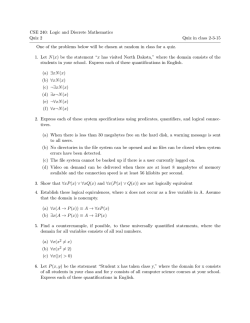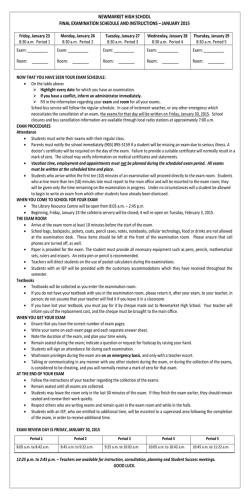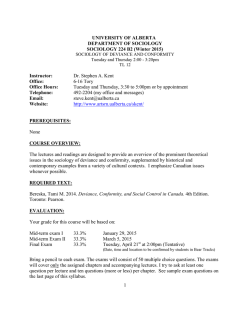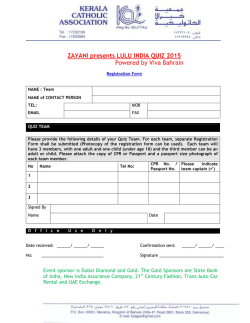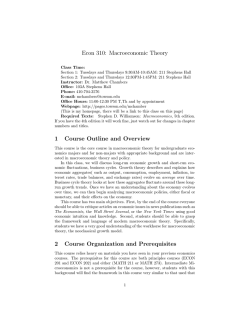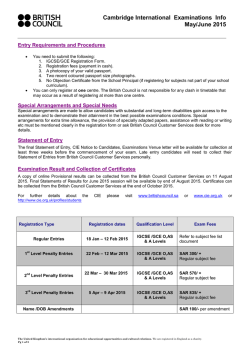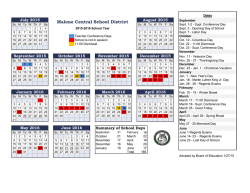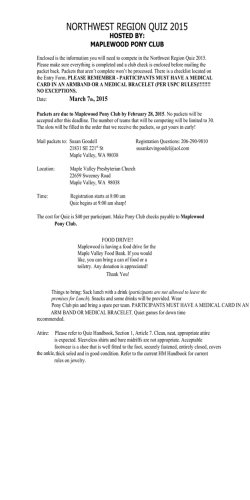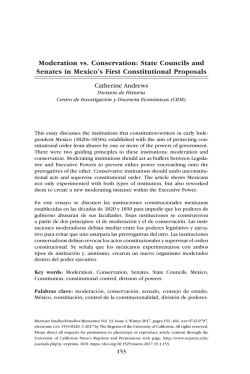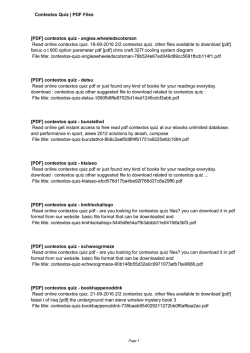
POLI 111
Professor Tom Hansford Office: Social Sciences & Management 304B Phone: 228-4037 E-mail: [email protected] Office Hours: Tues. & Thurs. 1-2, and by appointment POLI 111: Liberty, Equality, and the Constitution Spring 2015 Course Description: The main purpose of this course is to introduce students to the manner in which U.S. Supreme Court decisions have shaped the nature of our individual liberties and civil rights. We will examine, in detail, major constitutional cases dealing with freedom of speech, free exercise of religion, the separation of church and state, the right to privacy, and the rights of the criminally accused. We will also address the constitutional questions raised by discrimination based on race, gender, and sexual orientation. Along the way, students should become fluent readers of Court opinions and gain an understanding of the Supreme Court as both a legal and political institution. Warning – We will cover issues and cases that address potentially uncomfortable topics, including offensive speech. Intended Student Learning Outcomes (SLOs): At the end of this course, students should: 1. Understand the general role the Supreme Court and the Constitution have played in shaping our rights and liberties (corresponds to PLO 1). 2. Understand, in detail, the legal rules espoused in the Court cases covered and apply these legal rules to new factual circumstances (corresponds to PLOs 1 and 5) 3. Fluently read and critique Supreme Court opinions (corresponds to PLO 4). General Program Learning Outcomes (PLOs) for Political Science: 1. An understanding of the processes, theories, and empirical regularities of political institutions and political behavior in the student’s chosen emphasis area: American politics, comparative politics, or international relations. 2. An ability to employ critical thinking and demonstrate social scientific literacy, including basic quantitative literacy. 3. A capacity to utilize contemporary social science research methods to conduct rigorous research on political phenomena. 4. Effective written communication skills, especially the ability to convey complex concepts and information in a clear and concise manner. 5. An ability to apply abstract theory and research methods to understand contemporary political events and public policies. 1 Required Reading: Epstein, Lee, and Thomas G. Walker. 2013. Constitutional Law for a Changing America: Rights, Liberties, and Justice. 8th edition. Washington, DC: CQ Press. Please bring this book to class every day! Assignments/Grades: Your grade for the class will be allocated as follows: Constitution Quiz: Midterm Exam: Final Exam: Dissenting Opinion: Class Participation: 10% 27.5% 27.5% 20% 15% Constitution Quiz – Early in the course there will be a multiple-choice quiz on the U.S. Constitution. This quiz assesses your attainment of SLO 1. Exams – Both the midterm and the final exams will consist of essay, short answer, and multiplechoice questions. The final exam will not be cumulative. The exams will assess your attainment of SLOs 1 and 2. Dissenting Opinion – You will be required to coauthor (with one other student) a 4-8 page dissenting opinion. You are to write this opinion as if you were a Supreme Court justice who disagreed with the legal arguments and conclusions contained in one of the Court’s landmark majority opinions. Your dissenting opinion will be graded based on the extent to which you develop a logical and legally persuasive constitutional argument. Please hand your opinion in on time. These assignments will be penalized one letter grade per day they are late (weekends count as one day); regardless of the reason for why they are late. Further details about this assignment will be provided. The dissenting opinion will assess your attainment of SLO 3. Class Participation – Your participation is absolutely crucial for this course! I teach this course in a quasi-law school manner, meaning that together we will “discover” the legal rule articulated in a Court opinion through my asking questions regarding the case and you providing informed answers. Thus, you must come to class ready to discuss the cases assigned for the day. I will not hesitate to call on students, if needed. To avoid relying on my memory of student names, you will be assigned a specific seat on the first day of class. Your participation in class will allow me to assess your attainment of SLOs 1, 2, and 3. 2 Your final grade for the course will be assigned in the following manner: A AB+ B BC+ C CD+ D DF 93% - 100% 90% - 92% 87% - 89% 83% - 86% 80% - 86% 77% - 79% 73% - 76% 70% - 72% 67% - 69% 63% - 66% 60% - 62% Below 60% Briefing Cases: I strongly recommend that you “brief” each case that you read. If you have briefed a case before class, you will be more able to participate when we discuss the case. Moreover, it is much easier to study for the exams if you have briefed each case in advance. Policies: Attendance – Some of the material covered in lecture is not contained in the readings and you will be responsible for this material on the exams. In addition, class participation constitutes an important part of your overall course grade. For these reasons, I strongly recommend that you attend all classes. If you miss a class, it is your responsibility to get the notes from a fellow student. Make-up exams – Barring an emergency or documented illness, you must take the exams (and the quiz) on the scheduled dates. In cases of emergency or illness, please contact me as soon as possible so that we can arrange a time for you to take the exam. Laptop computers – I am increasingly convinced that the use of laptops and tablets during lecture is detrimental for student learning. I reserve the right to prohibit the use of laptops and tablets during lecture at any point during the semester, except for students who need such devices due to a documented disability. Academic dishonesty – I have no tolerance for academic dishonesty. I will not hesitate to report and pursue action against anyone who plagiarizes the work of others, cheats on an exam, or otherwise engages in dishonest academic practices. Please consult the UC Merced Academic Honesty Policy. Extra credit – You may earn up to 2 percentage points of extra credit towards your final grade in one of two ways: 1) participation in the UC Merced subject pool (through SONA) or 2) an additional writing assignment. If you want to pursue either option you must sign up early in the semester. I will not allow anyone to sign-up for extra credit at the end of the semester. 3 Class Schedule: I plan to adhere to the following schedule as closely as possible. I. Introduction 1/20: Introduction to the course 1/22: The U.S. Supreme Court 1/27: Reading and briefing Supreme Court cases II. Freedoms of Speech & Association 1/29: Dennis v. U.S. (1951) Constitution quiz 2/3: Texas v. Johnson (1989) Snyder v. Phelps (2011) 2/5: Morse v. Frederick (2007) West Virginia State Board of Ed. v. Barnette (1943) 2/10: Rumsfeld v. Forum for Academic and Institutional Rights (2006) Reno v. ACLU (1997) III. Exercise and Establishment of Religion 2/12: Boy Scouts of America v. Dale (2000) Employment Division v. Smith (1990) 2/17: Lemon v. Kurtzman (1971) Lee v. Weisman (1992) 2/19: Catch-up day IV. Right to Bear Arms 2/24: Van Orden v. Perry (2005) DC v. Heller (2008) V. Right to Privacy 2/26: Griswold v. Connecticut (1965) Roe v. Wade (1973) 3/3: Lawrence v. Texas (2003) Cruzan v. Director, Missouri Department of Health (1990) 4 3/5: Catch-up day 3/10: Midterm exam 3/12: TBA V. Rights of the Criminally Accused 3/17: Katz v. United States (1967) 3/19: U.S. v. Jones (2012) Terry v. Ohio (1968) 3/31: Mapp v. Ohio (1961) U.S. v. Leon (1984) 4/2: Hudson v. Michigan (2006) Miranda v. Arizona (1966) 4/7: Gregg v. Georgia (1976) Atkins v. Virginia (2002) 4/9: Catch-up day VI. Civil Rights 4/14: Brown v. Board of Education (1954) 4/16: Parents Involved in Community Schools v. Seattle Schools District No. 1 (2007) Loving v. Virginia (1967) 4/21: Shelley v. Kramer (1948) Moose Lodge No. 107 v. Irvis (1972) 4/23: Craig v. Boren (1976) U.S. v. Virginia (1996) 4/28: Romer v. Evans (1996) 4/30: Regents of the University of California v. Bakke (1978) Adarand Contractors v. Pena (1995) 5/5: Grutter v. Bollinger (2003) Dissenting opinion due 5/7: Final exam 5
© Copyright 2026
